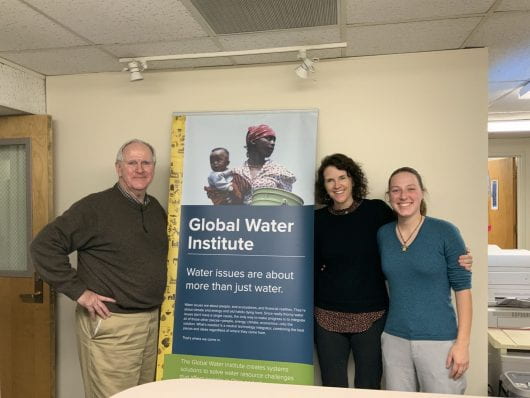
Global Water Institute team from left to right: Marty Kress, Amanda Davey and Michelle Cane. Credit: Gabriela Okhuysen | Lantern reporter
After 46,000 water projects failed, Ohio State helped 5 million people in Tanzania have clean water — and it’s not done yet.
Ohio State’s Office of Research started the Global Water Institute in 2013 with an initiative to solve complex water issues. GWI grew into its ongoing project that will bring sustainable water systems to more than 50 villages in Tanzania, Marty Kress, executive director of GWI, said.
In developing countries, 40 to 60 percent of all new water systems fail in their first year, Kress said. The institute’s goal was to change the fate of water systems in Tanzania, which had 46,000 failed water projects before GWI stepped in, Kress said.
Unsuccessful investments created false hope in communities that needed water for agriculture, sanitation, cooking, personal hygiene and drinking, Kress said.
Even when projects started successfully, if something as simple as a hand pump broke, the entire operation would come to a stop, Amanda Davey, program manager of GWI, said.
“The big part of why these systems fail is the people don’t have the capacity to fix them,” she said.
In order to ensure water well systems could be maintained, Davey said GWI began to train local people in technical skills to repair the wells after they were installed by in-country partners.
The training promoted greater social impact in communities with wells because as the water was distributed, schools and clinics could have sanitation, and female entrepreneurs began generating revenue after they did not have to spend time gathering water for the household, Kress said.
“Water is a catalyst for economic activity, as well as hygiene and sanitation, but you need all the pieces of that system, and then you gotta make it a sustainable business, not just a charitable donation,” Kress said.
Since installing the wells, Kress said school attendance among girls and boys has gone up 10 to 12 percent because they are no longer tasked with fetching water for their homes.
However, GWI’s mission is far from complete.
The team is competing to win the MacArthur Foundation grant proposal — a $1 million, four-year endowment to any project or pursuit run by U.S. citizens or residents — and is currently ranked in the top 100 contenders, Kress said.
If granted this award later this year, GWI wants to deploy sustainable water systems to 250 more villages in Tanzania, Kress said.
“When you look at all the different entities we are creating, there’s a large point of intersection that, down the road, would be the next step to really enhance the image of Ohio State,” Kress said.
Through its trips, GWI aims to create more interdisciplinary teams to open up to students, faculty and staff with a wide range of expertise in order to solve complex problems with long-term resolutions, Kress said.
“If you run the solar lab at OSU, you can come in and install solar lighting or a solar hot water heater,” Kress said.
Michelle Cane, student activity program assistant at GWI, said GWI can also help students’ global perspective.
“It is crucial in this day and age to have a global perspective in everything that you’re doing. Places like GWI that are actively involved in the global community are an indispensable resource that students should be taking advantage of,” Cane said.
GWI runs capstone classes in the College of Engineering and leads multiple trips to Tanzania with students in the Fisher College of Business, Kress said.
Davey said the connections students make help them realize what they share with people in Tanzania.
“The reason why these experiences are so transformative is because we get these students over there interfacing,” Davey said. “They recognize this common humanity, and it takes down all these walls and it’s really soft diplomacy. It’s building peace.”
To learn about upcoming events and how to get involved, students, faculty and staff can visit GWI’s website.
The Engaged Scholars logo accompanies stories that feature and examine research and teaching partnerships formed between The Ohio State University and the community (local, state, national and global) for the mutually beneficial exchange of knowledge and resources. These stories spring from a partnership with OSU’s Office of Outreach and Engagement. The Lantern retains sole editorial control over the selection, writing and editing of these stories.



